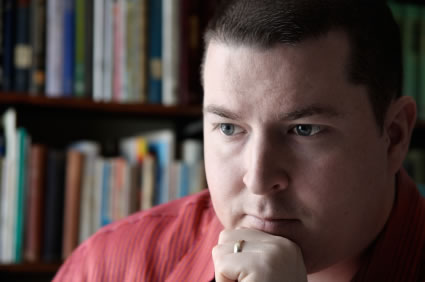
Photo by Jaren Wilkey
Other studies have shown that blocking people from achieving their positive goals increases frustration, which is not surprising. But this is the first to show that even denying people the chance to commit forbidden behaviors can increase frustration.
That’s not all. The researchers also found that people who are frustrated in their attempts to cheat or steal are more likely than others to be attracted to violent video games.
“We made new discoveries in what makes people frustrated and aggressive, but also what people do when they’re feeling this frustration,” said Brad Bushman, co-author of the study and professor of communication and psychology at Ohio State University.
“Our results help us understand why people are attracted to violent entertainment in the first place – they feel they can take out their frustration virtually.”
Bushman conducted the study with Jodi Whitaker, a graduate student at Ohio State, and Andre Melzer and Georges Steffgen of the University of Luxembourg.
Their results appear online in the journal Psychological Science.
The researchers conducted two experiments. The first involved 120 male college students, who were given 30 minutes to complete a multiple-choice history exam. They were told that those who did well on the exam would earn chocolates or apples (their choice).
All of the participants were given the exam in an envelope. But half of them received a completed exam with a score of 100 percent marked at the top – the test had no name on it, so they could claim it as their own.
After five minutes, the experimenter interrupted participants and said: “Sorry, I gave you the wrong copy of the exam.” The participants handed back their exams in the envelope, and were given another envelope with the exam. This exam was also either scored 100 percent or left blank.
Of those who initially were given the chance to cheat on the exam, half still had the chance to cheat, while that chance was withdrawn for the other half.
After turning in their tests, the students waited to receive their grades.
The question was: How would those people who lost their chance to cheat react? To find out, the students were told they could complete a brief study about video games while they waited for their test results.
Participants read descriptions of eight fictitious video games, four violent and four nonviolent, and rated how much they wanted to play each game on a scale of 1 (not at all) to 10 (extremely).
Those students who had the chance to cheat withdrawn were more attracted to the violent video games than those in the other two groups (never had a chance to cheat, or had a chance to cheat the entire time). The latter two groups did not differ in their attraction to violent video games.
None of the three groups differed in their attraction to nonviolent games.
Bushman noted that none of the students admitted to cheating, or having the chance to cheat, even though they did cheat (as evidenced by their scores). But the students who were denied the chance to cheat obviously had a different view than others on their video game choices.
“Because violent video games permit aggression, they may be especially attractive to people who experience frustration,” Bushman said. “We believe students felt frustrated when they didn’t get a chance to cheat on the test.”
The researchers looked more closely at the link between frustration and attraction to violent video games in a second experiment that included 141 male college students. This experiment involved stealing rather than cheating. Students used a bowl of quarters to demonstrate their estimate of how many coins would weigh the same as an object.
In a similar setup to the first study, some students had the opportunity to steal coins, while others had that opportunity taken away from them. The remainder never had the opportunity to steal.
Afterwards, the students completed a “mood” form, in which they were asked to rate on a scale of one to five how much they felt various feelings, including frustration. They then rated how much they wanted to play the same eight fictitious video games used in the first study.
First of all, students who did have the chance to steal tended to do so – an average of between about one and three quarters, depending on their level of access, Bushman said.
Those who had the chance to steal withdrawn from them showed higher-than-average levels of frustration than those in the other two groups – and they were more likely to be attracted to the violent video games.
“The prevention of taboo behaviors like stealing produces frustration, just as does the prevention of more desirable goals,” Bushman said. “This is a new finding that adds to our understanding of what causes frustration and aggression.”
The results also help explain the appeal of violent video games.
“Many people believe that violent video games are a kind of catharsis, allowing them to alleviate angry feelings,” he said. “Research findings suggest this isn’t true, but that’s part of the appeal to many people.”


